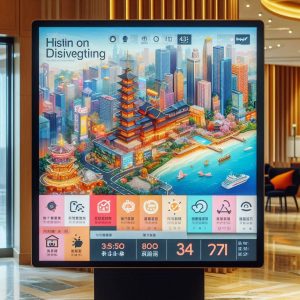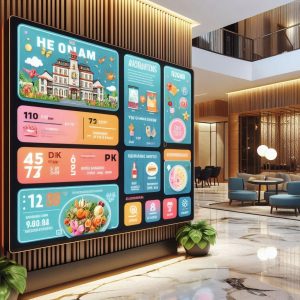Emerging as a leading light location within the field, London has consistently shown itself to be a beacon of innovation at the head of the hospitality industry.
To stay ahead of the curve, one needs to be constantly adapting to be able to meet the needs of modern guests, and this is the case for any establishment from luxury hotels to even venues to restaurants and more.
One of the most valuable tools in achieving this adaptation is digital signage, which has shown itself to be transformative for aspects like operational efficiency and enhancing guest experience.
To gain a clearer understanding on how exactly this technology can be beneficial, here is a rundown of some of the major features and advantages that integrating digital signage into hospitality settings can have for establishments.
1. Real Time Information Delivery

For most businesses, the most practical benefit of digital signage is its ability to deliver real time information in an instant. Areas like hotel lobbies where screens can provide guests with updates on things like event schedules, check in/out times and local attractions can greatly enhance the experience.
In a restaurant environment, screens can be used to display menus, dietary options and daily specials, as well as things like allergen warnings to ensure guests can make the best, most well-informed choices. The instant nature of this kind of adaptability means that the guest experience will always be up to date.
2. Branding And Ambience Enhancement
Alongside practical information benefits, the truth is that digital signage has been an attractive design element in its own right. Something you might notice is that the more luxury the hotel or restaurant is, the more it might rely on the sophistication and sleek style that well placed screens can evoke.
These screens can be utilized to share dynamic, themed images and decoration to reflect seasonal changes and occasions, making the entire environment much more immersive. It goes without saying, of course, that company logos and colours can be incorporated into the attractive imagery, further reinforcing brand identity and reputation.
Digital signage providers like Kitcast.tv for example, customise digital signage, making it a vital asset for a business to keep up and even stay ahead of the competition in a crowded market.
3. Streamlining Operations

Whilst guests of upmarket London hospitality desire a smooth, calm experience, this can only be achieved by maximum, fast paced efficiency behind the scenes. Various digital signage can play a huge role in achieving this balance, with features like interactive kiosks allowing guests to perform necessary tasks like checking in and out, placing orders and exploring amenities without having to wait for assistance from staff.
From an employee perspective, access to staff facing screens that can display real time information on things like room/table availability, team schedules and more can help to reduce delays and make the guest experience as seamless as possible.
4. Interactivity Boosts Engagement
In previous generations of hospitality culture, guests were only able to engage with a brand through direct staff contact, which could be very limited depending on employee availability numbers at any given time. With the integration of touchscreen displays, however, hotel lobbies in particular can now be considered spaces that allow visitors to explore and engage at their own pace, on their own time. From interactive maps to amenity details to information on local attractions, everything one needs to feel more engaged with the guest experience is there at the fingertips.
Alternatively, in places like bars and restaurants, signage can be used in the form of gamified content that can entertain patrons while they wait for their food and drink. This level of connectivity and engagement has the potential to foster a much stronger sense of community.
5. Supporting Sustainability Goals

Outside of the pure guest experience, there is also a significant concern of environmental consciousness. Crucially, digital signage can offer a more sustainable alternative to the more traditional paper based and other physical material methods of previous signage. Replacing things like brochures, printed menus and flyers can significantly reduce a brand’s wastage.
And this does have a positive knock-on effect for guests, as more and more patrons are now being discerning in the brands and establishments, they choose to engage with based on their attitude towards the environment.
So, it’s clear that digital signage in hospitality can play a crucial role in the future success of any business.
Author Profile

- Informed content writer and creator in the UK, always on the lookout for new stories, developments and trends to share.
Latest entries
 Business AdviceMarch 18, 2025Beyond Traffic Bots: Sustainable Paths to Real Business Growth
Business AdviceMarch 18, 2025Beyond Traffic Bots: Sustainable Paths to Real Business Growth BusinessMarch 4, 2025Renewable Energy in the UK – Business Opportunities Towards a Greener Future
BusinessMarch 4, 2025Renewable Energy in the UK – Business Opportunities Towards a Greener Future CryptocurrencyFebruary 19, 2025Crypto Custody Solutions Explained
CryptocurrencyFebruary 19, 2025Crypto Custody Solutions Explained BusinessJanuary 4, 2025How to Create a Personalised Professional Development Plan
BusinessJanuary 4, 2025How to Create a Personalised Professional Development Plan




